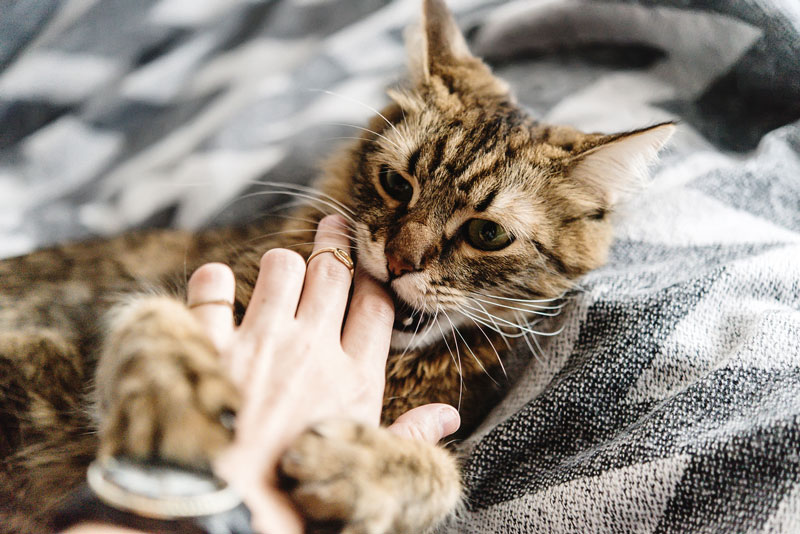Training
How to Train a Cat to Stop Biting in 9 Easy Steps

Your pet cat is part of your family. It’s alarming if he suddenly bites you or a family member. It’s important to understand what can provoke a cat to bite and how to stop it. So, how do you train a cat not to bite?
Why Do Cats Bite?
Cat bites are more common than dog bites. Most cat bites come from a pet cat that’s known by the person who gets bit. There are many reasons why cats bite.
Here are some common reasons why your cat might bite.
Kittens
Kittens are more likely to playfully bite. This is because they’re teething and learning to interact with humans. If the kitten is part of a litter, his family cat members will bite him back so he’ll learn that biting hurts and stop. Otherwise, around 4 months of age, kittens stop the playful biting and scratching.
Personality
Every cat has its own personality.
Studies by Dr. Lauren Finka, a postdoctoral researcher in animal welfare in Nottingham Trent University’s School of Animal, Rural and Environmental Sciences found that a cat’s parents are a good indicator for what the cat’s personality will be like as an adult.
A friendly parent cat will give birth to a friendly kitten even if the kitten was separated from its parent cat early on. Vice versa, an aggressive, fearful parent cat will give birth to an aggressive, fearful kitten.
Fear
A cat bites if he’s afraid.
He might be afraid of another animal like a dog, or a human who’s unkind to him. Out of fear, he bites anyone around. He is afraid of a child who handled him roughly. He bites the child so the kid stays away. If you notice your cat’s body language indicates he’s afraid, defuse the situation. Remove what’s frightened him. Then give him some space alone until he calms down.
Illness
Another reason cats bite is illness or pain. Health issues like dental problems, arthritis or even fleas are painful and distracting to a cat.
If your cat suddenly bites you, get him checked out by a vet to be sure he’s healthy.
Declawing
Cats that are declawed tend to bite more. They can’t defend themselves, so they bite.
Sometimes declawed cats experience long term pain from the declawing process and that causes them to bite.
9 Methods to Stop Cats From Biting
Stopping your cat from biting is possible. Here are several methods to help you:
1. Find out why your cat is biting
Check out the list above to find the cause. If you’ve added a new dog to the family he may be stressed out by your new dog. So, give him extra time and attention alone without the dog around.
2. Never yell or hit your cat.
This won’t stop his behavior, but it might make it worse. Be patient with him. Give him extra cuddles or he might need some time alone. Your behavior can help defuse your cat’s anxiety or aggression.
3. Remove stressful triggers
After you’ve removed everything that’s upsetting your cat and you are patient with him, but he’s still biting, then you might need to be more direct.
4. “Time out”
When your cat bites you, remove him to another room away from you.** This is like a “time out” for him. Hopefully, as you do this every time he bites, he’ll eventually understand that you don’t like it when he bites. Be consistent, he’ll stop biting over time.
5. Reward for good behavior
Another idea is to give your cat rewards when he’s being good and doesn’t bite.
6. Get his attention
You can try to frown at him when he bites you. Say, “Ouch!” loud enough that you catch his attention.
7. Ignore cat if he bites
The idea here is that sometimes cats bite to get your attention. If you ignore his bite, he’ll try another way to get your attention.
8. Give your cat more attention
Cats sometimes bite out of frustration or they want more attention from their owner. Give your cat adequate time and attention especially if you’re gone all day at work. Cats go through periods where they want more attention, sometimes even biting to get it from their owners.
9. He’s bored
Get some cat toys, or even another cat will help your cat. We will link some toys below that we recommend trying out.
Petstages Tower of Tracks Cat Toy

This addictive, interactive cat toy is designed with 3 levels of tracks and 3 brightly colored moving balls to attract kitty’s attention!
KitNipBox - Monthly Cat Subscription Box of Cat Toys, Treats and Goodies

The Happy Cat KitNipBox comes with 5 toys, treats, and/or other cat goodies. Each box is uniquely themed and includes custom items designed exclusively for KitNipBox customers.
How to treat a cat bite
Cat bites are dangerous if left untreated. Even more so if the cat that bit you or your child is a stray. Stray cats can carry rabies or cat fever.
Even if your own cat bit your or your child, treat the wound right away. Statistically, one in three cat bites get infected. Here are several steps to treat care of a cat bite:
- If the bite isn’t deep, and you know the cat has been immunized, wash out the cut with soap and water. Do not scrub it because that can cause bruising. Put an antibiotic cream on the cut. Keep an eye out for infection in the first 24 hours. Look for redness, swelling, fever or excessive pain and swollen lymph nodes.
- If the cat is unfamiliar to you, or a known stray cat, take your child to the doctor immediately. Contact the local animal control services immediately so they can catch the stray cat. The will confine the cat to observe him for any rabies symptoms. Never try to catch the cat yourself, you might get bit again. The doctor might prescribe antibiotics to heal the wound or give a tetanus shot.
- For a deeper bite, apply pressure with a clean rag or bandage to stop bleeding. Wash out the wound with soap and water. Call your doctor or health provider for help and to report the incident to local animal control services. You or your child might need a tetanus shot or oral antibiotics to help heal the wound.
Always contact your doctor if you or your child devops symptoms such as:
- decreased appetite
- headache
- swollen glands
- flu-like system or an overall feeling of discomfort after an animal bite. This could be cat fever. If the cat is known, check his rabies vaccination records. If he’s not up to date, he’ll need to be quarantined.
Summary
Cats are sweet family pets. Sometimes, for no reason, your cat bites you or a family member. It’s important to determine why he bit you.Once you understand why he bites, you can remove him from the situation that makes him bite or you can train him to stop biting.
It’s important to treat a cat bite immediately especially if the cat has not been immunized. He will need to be quarantined and observed for rabies. Hopefully, your cat will stop biting quickly and be back to his sweet, cuddly self as your family pet.
- Topics:
- Training


